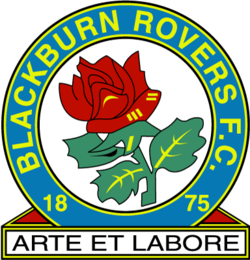User:6625/Blackburn Rovers
Blackburn Rovers are a football club, from Blackburn, Lancashire. They are the official team of the Labour Party with their common fans and red rose insignia and are famous for their rough style of play, hate of the posh, and beating Manchester United all the time. They are the forgotten team of the Premiership.
History[edit | edit source]
They apparently date back to the Norman times, William the Conqueror took them over in the Doomsday Book. This led to riots and demonstartions not too unsimiliar to whats currently going on up at Newcastle. They carried on their merry way through history before their Lancashire red rose fought with Sheffield United's white rose for the Premiership title. This all wound up in peace when manager Henry Tudor married the Blade's managers wife. Oopsky. In 1872, a time of great advertisement, Labour candidate for Blackburn & Darwen, Arte Et, sponsored himself on the team's badge. To this day it still says "Arte Et Labour".
The FA Cup started that same year, and pissed off of public school kids running with the ball in their hands, Rovers invented football and won the Cup 3 times in a row. Much of their support still comes from the 1880s,in a Tardis. The old enemy, Bolton, outshone the team for most of the 1900s, until in 1995, the premiership decided they wanted someone other than Manchester United to win the league and Blackburn were pulled out of the hat. Two years later they were relegated. The club is now in a nouvea riche, with Europe's best players in most positions.
Rivals[edit | edit source]
The teams of the Northwest: Bury, Rochdale, Blackpool, Preston and Burnley, plus anyone who criticises Gordon Brown. Oh, that's the whole nation.
Fans[edit | edit source]
Each and everyone of Blackburns ten thousand fans is a fat gruff man, and probably votes labour. However many other fans of theirs include the top-hatted gentlemen of the good days of the 1880s, and the local Pakis.
